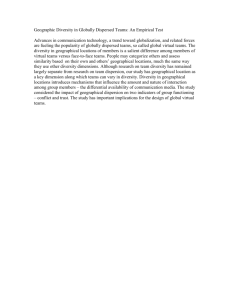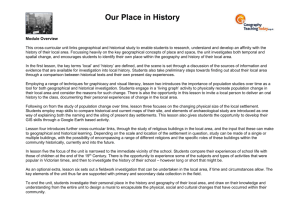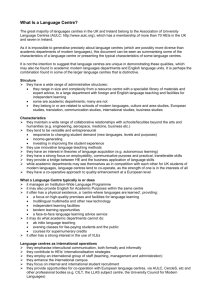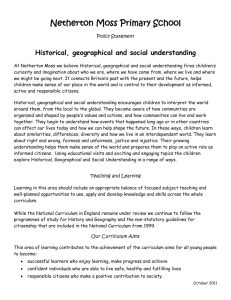2009 HSC Examination Q20, Marking Crit, Examiners comments
advertisement
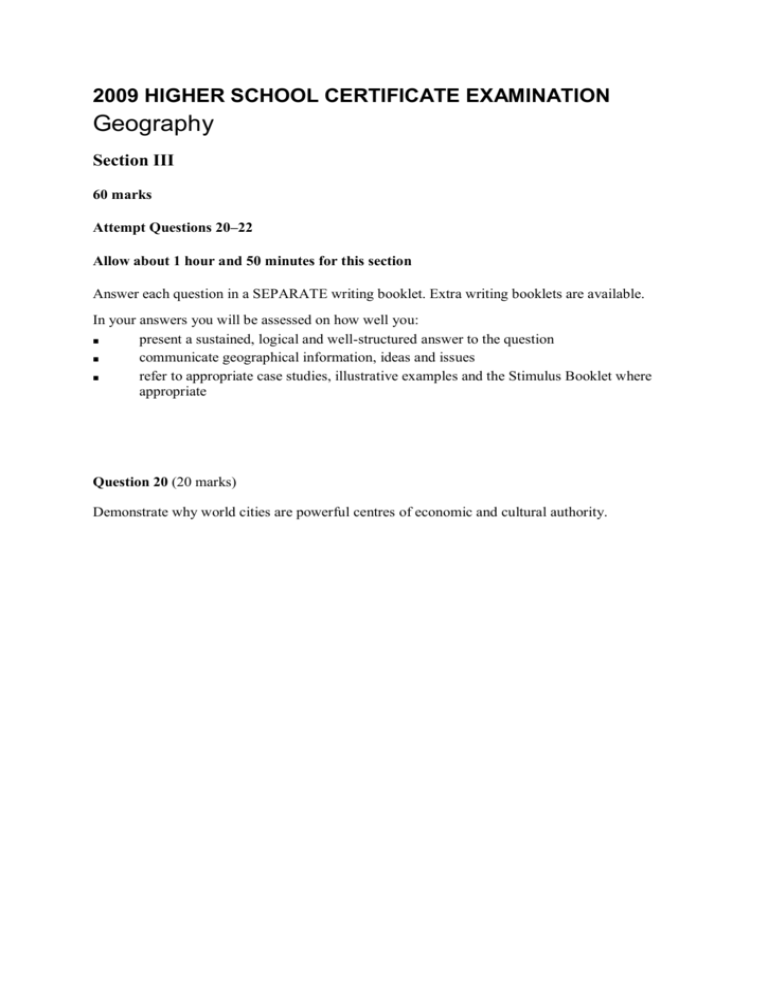
2009 HIGHER SCHOOL CERTIFICATE EXAMINATION Geography Section III 60 marks Attempt Questions 20–22 Allow about 1 hour and 50 minutes for this section Answer each question in a SEPARATE writing booklet. Extra writing booklets are available. In your answers you will be assessed on how well you: ■ present a sustained, logical and well-structured answer to the question ■ communicate geographical information, ideas and issues ■ refer to appropriate case studies, illustrative examples and the Stimulus Booklet where appropriate Question 20 (20 marks) Demonstrate why world cities are powerful centres of economic and cultural authority. 2009 HSC Geography Marking Guidelines Section III Question 20 Outcomes assessed: H1, H6, H7, H12, H13 MARKING GUIDELINES Criteria • Shows by well chosen examples the detailed reasons why world cities are powerful centres of economic and cultural authority • Demonstrates deep knowledge and understanding about world cities as powerful centres of economic and cultural authority • Refers to relevant cases studies, illustrative examples and the stimulus booklet where appropriate • Presents a sustained, logical and well structured answer using appropriate geographical information, ideas and issues • Shows using examples the reasons why world cities are powerful centres of economic and cultural authority • Demonstrates understanding about world cities as powerful centres of economic and cultural authority • Refers to case studies, illustrative examples and the stimulus booklet where appropriate • Presents a logical and well structured answer using appropriate geographical information, ideas and issues • Give reasons why world cities are powerful centres of economic and cultural authority • Demonstrates some understanding about world cities as powerful centres of economic and cultural authority • Refers to case study/illustrative examples • Presents a structured answer using appropriate geographical information • Makes statements about why world cities are powerful centres of economic and/or cultural authority • Uses some geographical information • Demonstrates limited understanding of world cities • Limited or no reference to geographical information Marks 17–20 13–16 9–12 5–8 1–4 2009 HSC Notes from the Geography Marking Centre Section III Question 20 In better responses, candidates demonstrated a very clear link between geographical content and detailed case studies and data. There was a clear appreciation of the concepts of world city theory and the relationships between the theory and world city development. The better responses also had a considerable understanding of a range of world cities. Common examples of New York, London and Tokyo were supplemented with others like Sydney. Another facet of the better responses was their use of accurate data; for example, it was common to see not just names of transnational corporations but numbers, names of leaders and the volume of business they carried out. These were sophisticated responses showing knowledge and understanding of flows, linkages and hierarchical relationships. There was clear evidence of higher-order thinking and explicit explanation of why world cities are powerful centres of economic and cultural authority. Weaker responses simply described world cities with little or no links to the nature of economic or cultural authority. Many gave superficial reasons which often had little relevance to the question. Many candidates could not explain and illustrate ‘why’ world cities exhibit authority. Cultural authority proved more difficult for many, some students interpreted this as a demographic of their sample city’s population, others interpreted it as the role the city generates, eg museums, galleries, events, sport and fashion/art. Some candidates confused the question with culture of place in a large city.


